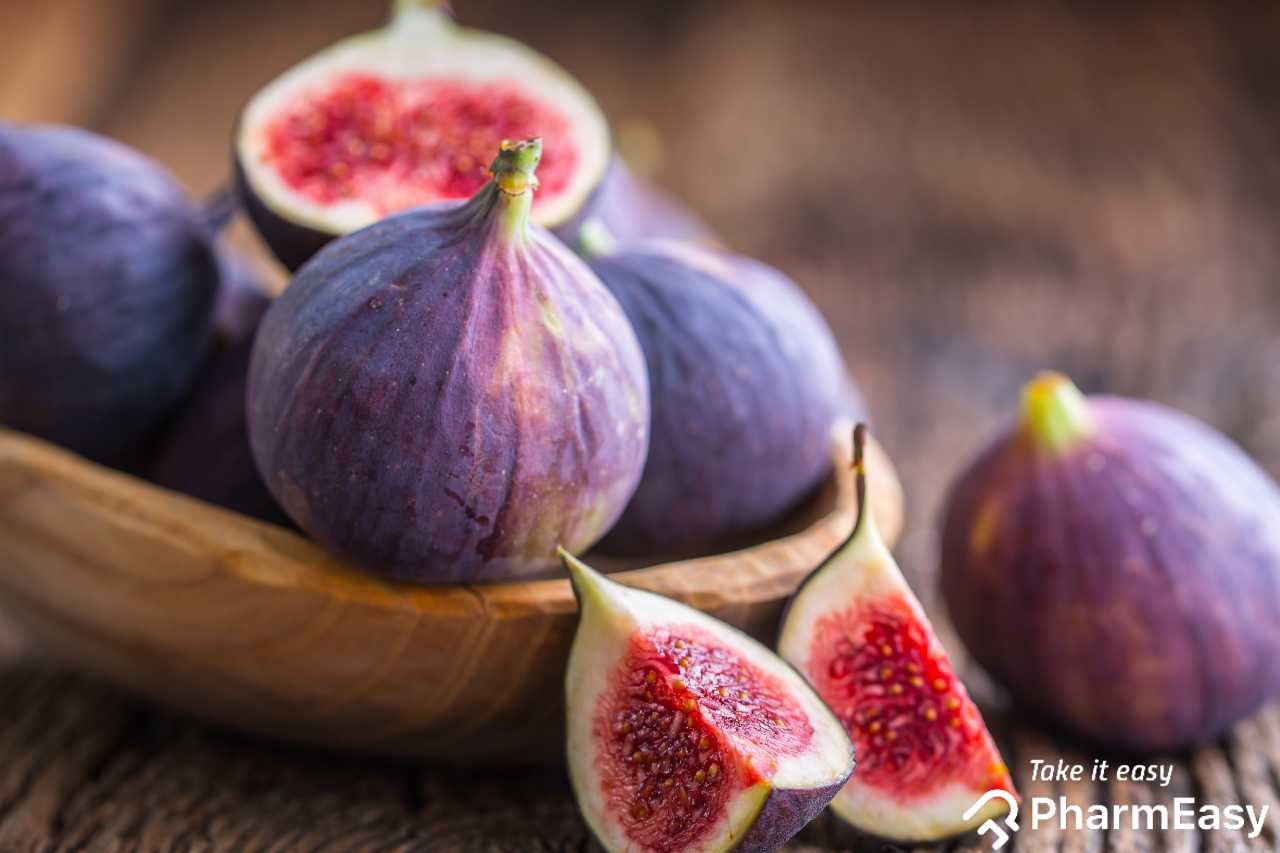6 Fantastic Health Benefits Of Fig
By PharmEasy Medical Board +2 more

Get,

to manage your symptom
Get your,


4 Cr+ families
benefitted

OTP sent to 9988776655



You’ve successfully subscribed to receive
doctor-approved tips on
Whatsapp

Get ready to feel your best.

Hi There,
Download the PharmEasy App now!!


Register to Avail the Offer
Send OTPBy continuing, you agree with our Privacy Policy and Terms and Conditions

Hi There,
Sign up on PharmEasy now!!
Trusted by 4 crore+ families

OTP sent to 9988776655



You have unlocked 25% off on medicines




Code: NU25



By PharmEasy Medical Board +2 more
Table of Contents
Do you wonder what figs are? Figs, commonly known as Anjeer are the fruit of the ficus tree, a part of the mulberry family. Fresh figs fruit are usually soft from the center accompanied by crunchy seeds. This unique texture makes it a great fruit to enjoy just the way it is. Most of us remember Fig or Anjeer in the form of a dry fruit when the seeds turn more crispy and the flesh dries up. Fresh figs are seasonal and perishable. Dried Anjeer can be enjoyed all year round. They are often part of the healthy diet as a replacement to the table sugar and thus act as a natural sweeter.
Figs nutritional value includes a natural source of sugar, soluble fibre, and lots of minerals. The one mineral which is very important for all of us and mostly growing women is Iron. Figs both fresh and dry are an excellent source of iron. Fig nutrition includes a wide range of nutrients like potassium, calcium, magnesium, copper, antioxidants like vitamin A and Vitamin L which can contribute to overall health and wellness.

Interesting Fact: It is being observed that figs due to their high alkalinity can help people to quit smoking by reducing their desire to smoke.
Figs are not only delicious and versatile but also rich in antioxidant and phenol substances. These remarkable properties may contribute to enhancing your antioxidant defence system. Antioxidants play a crucial role in protecting your body against the damaging effects of oxidative stress. Oxidative stress occurs when there is an imbalance between harmful free radicals and your body’s antioxidant defence system.
Dr. Siddharth Gupta, B.A.M.S, M.D (Ayu)
Figs come in various types, each with its unique flavor, color, and characteristics. Some common varieties include:
Renowned for its dark purple to black skin and vibrant pink flesh, the Black Mission Fig is a sweet and flavorful variety. Its versatility makes it suitable for both fresh consumption and various culinary applications.
Recognizable by its brownish-purple skin and sweet, mild flavor, the Brown Turkey Fig is a popular choice for eating fresh, drying, or incorporating into jams and desserts.
With its light green skin and amber flesh, the Kadota Fig offers a delicate, sweet taste. This variety is often enjoyed fresh or used in preserves, showcasing its subtly honeyed notes.
Distinguished by its pale yellow-green skin and nutty, almost butterscotch-like flavor, the Calimyrna Fig is commonly consumed in its dried form. It pairs well with cheeses and adds a sweet dimension to salads.
This green-skinned fig features a light pink interior and a sweet, milder flavor. Often enjoyed fresh, the Adriatic Fig is a favorite for its delicate taste and versatile use in both sweet and savory dishes.
Also known as the Sugar Fig, the Celeste Fig boasts a small, violet-brown fruit with a honey-like sweetness. This variety is well-suited for fresh eating and is a popular choice for home gardeners.
Recognizable by its striped green and yellow skin, the Panachee Fig offers a sweet, rich flavor. It is a visually striking variety and is enjoyed fresh or incorporated into desserts.
The Osborne Fig is characterized by its dark purple skin and red interior. It is known for its intense sweetness and is often dried for a concentrated burst of flavor in various culinary creations.
Did You Know?

Figs are well-thought-out to be an age-old remedy to cure constipation and thus help nourish the intestines. Figs act as a natural laxative due to their high soluble fibre content. Thus, eases out the strained bowel process. Try consuming 2 to 3 dry figs empty stomach to help relieve constipation.

Figs benefits in weight loss as it is rich in fibre and can be a perfect snack or mid-morning munchies, especially for weight watchers. Dried Anjeer makes a great nutritious snack. 2 or 3 dried figs can make you feel fuller for longer and this can help keep longer gaps between your two meals.
Did you know figs have the potential to fight against cancer cells? Figs possess different bioactive components in different parts of the plant, and these components may exert varying levels of anticancer effects. By incorporating figs into your diet, embrace their natural goodness and potential anticancer properties.
Dr. Rajeev Singh, BAMS

Fast-food consumption has been increasing day by day and this can lead to high blood pressure problems. High blood pressure often leads to an imbalance of potassium levels in your body. Figs being a good source of potassium can naturally improve potassium levels and thus might control blood pressure.

Figs are a great source of prebiotics. Prebiotics can support the function of probiotics which can help improve the digestion process and overall gut health. Being fibre-rich, also adds bulk to the stool, enabling normal bowel movement.

Figs were reflected as love fruit since ancient Greek times, where figs were considered a symbol of fertility. This was later researched and was termed true based on its high iron content. Iron plays an essential role in the entire ovulation process in females. For males, low iron may affect sperm quality and motility. It is very commonly consumed with milk even today to boost reproductive health.

Being high in fibre and potassium helps remove the excess fat from the body and pressure from the heart. This can drastically help improve the health of your heart. Along with these two functions, Figs are also a great source of antioxidants which not only reduces the free radicals but also helps reduce triglycerides and bad cholesterol. Therefore, making your heart stronger and letting it live for longer.
Fig leaves show potential in managing diabetes. They contain bioactive compounds that can positively influence blood sugar levels. Fig leaves may help improve insulin sensitivity, allowing your body to use insulin more effectively.
Dr. Smita Barode, B.A.M.S, M.S.
Figs benefits for male sexual health as they are packed with essential minerals such as zinc and magnesium, and they play a crucial role in supporting reproductive functions, including sperm production and fertility. Furthermore, the amino acids found in figs contribute to increased libido and enhanced sexual stamina. By incorporating figs into the diet, men can enjoy not only the general health benefits but also specific advantages in promoting sexual well-being.
Figs offer invaluable benefits for women’s health across various life stages. During pregnancy, the fruit’s rich iron content helps prevent anemia, supporting both the mother and baby’s well-being. Additionally, the fiber in figs aids in digestion, easing common pregnancy-related digestive issues. For women’s sexual health, figs contribute to overall vitality through their combination of essential vitamins and minerals. Furthermore, the potassium content supports heart health, essential for maintaining optimal circulation and overall reproductive well-being. Whether supporting pregnancy or enhancing women’s sexual health, incorporating figs into the diet can be a delicious and nutritious choice.
Figs are a natural ally for skin health, offering a potent blend of vitamins and antioxidants. Rich in vitamin A and E, figs support skin regeneration and protection against environmental damage. The presence of minerals like potassium and magnesium aids in maintaining skin hydration and preventing dryness. Figs’ anti-inflammatory properties can also soothe skin conditions, making them a valuable addition to a skincare routine. Incorporating figs into your diet may help nurture a vibrant and glowing complexion.
Figs benefits for hair health includes essential nutrients like vitamin C, E, and biotin. These elements contribute to hair strength and growth, promoting a healthier scalp. The presence of antioxidants in figs helps combat free radicals, potentially reducing hair damage and premature graying. Figs also provide natural moisture, aiding in preventing dryness and promoting overall hair hydration. Including figs in your diet can be a nourishing addition to support lustrous and resilient hair.
Figs offer valuable benefits during pregnancy as they are rich in essential nutrients like folate, crucial for fetal development and preventing neural tube defects. The high fiber content aids in maintaining healthy digestion, alleviating common pregnancy-related digestive issues. Figs also provide a natural source of iron, supporting the increased blood production demands during pregnancy. Additionally, the presence of potassium in figs can help regulate blood pressure, contributing to a healthier pregnancy. Including figs in a well-balanced diet can be a nutritious choice for expectant mothers.
Also Read: Anjeer (Dried Fig): Uses, Benefits & Side Effects
Exciting research suggests that incorporating figs into your diet may help improve cognitive and behavioural deficits associated with Alzheimer’s disease. Figs contain unique compounds that protect brain cells, reduce inflammation and promote overall cognitive function. While figs cannot cure Alzheimer’s disease, they can be a natural addition to your management plan, supporting brain health and enhancing well-being.
Dr. Anuja Bodhare, B.A.M.S, M.D (Ayu)
Figs offer significant benefits for your bone health thanks to their high mineral content. Figs have the potential to be used as a support for the maintenance of healthy bones.
Dr. Ashok Pal, BAMS
Also Read: Benefits of Figs Soaked in Water Overnight: Exploring Nutritional Advantages
Also Read: 10 Health Benefits And Recipes Of Dragon Fruit (Pitaya)
Figs are rich in fiber, vitamins, and minerals, promoting digestive health, supporting heart health, and providing essential nutrients. Their natural sweetness makes them a delicious and nutritious addition to a balanced diet.
Figs can be a part of a diabetic-friendly diet due to their high fiber content, aiding in blood sugar regulation. It’s important for individuals with diabetes to consult with a healthcare professional for personalized dietary advice.
Figs can be a nutritious addition to a pregnancy diet, offering essential nutrients like iron and fiber. However, pregnant individuals should seek advice from a healthcare professional to ensure a well-balanced and safe dietary plan during pregnancy.
Figs can support weight loss efforts as they are low in calories and high in fiber, promoting a feeling of fullness. Nevertheless, individuals aiming for weight loss should seek guidance from a healthcare professional to create a personalized and sustainable dietary plan.
In traditional medicine, figs are often considered “heaty” due to their warming properties, which may be beneficial in certain climates. However, individual responses to food vary, and it’s advisable to consult with a healthcare professional or traditional medicine practitioner for personalized advice on dietary choices and their impact on the body’s “heatiness.”
Figs, being rich in fiber, can aid in relieving constipation, which is beneficial for managing piles. Individuals with piles should consult a healthcare professional for personalized advice on dietary choices and comprehensive care.
Figs, being calorie-dense and nutrient-rich, can be a healthy addition to a diet for weight gain. However, individuals seeking weight gain should consult with a healthcare professional to ensure a balanced and sustainable approach tailored to their specific nutritional needs.
Yes, figs are beneficial for relieving constipation due to their high fiber content, promoting regular bowel movements. Individuals with persistent constipation should seek advice from a healthcare professional for personalized dietary recommendations and potential underlying causes.
Figs contain antioxidants and fiber that may support liver health by aiding digestion and reducing oxidative stress. However, individuals with liver conditions should consult a healthcare professional for personalized advice tailored to their specific health needs and circumstances.
While figs are generally healthy, individuals with kidney issues should consult a healthcare professional for personalized advice, as figs contain potassium, which can affect those with impaired kidney function. Customized dietary guidance is essential for kidney patients to maintain optimal health.
Figs may contribute to lowering cholesterol levels due to their soluble fiber content, which can help manage overall cardiovascular health. However, individuals with cholesterol concerns should seek guidance from a healthcare professional to determine the most effective dietary approach for their specific conditions and needs.
Yes, dogs can eat figs in moderation as they are a good source of fiber and essential nutrients. However, it’s crucial to consult with a veterinarian for guidance on feeding practices and potential allergies to ensure the safety and well-being of your pet.
Yes, you can freeze figs to preserve their freshness. Simply wash, dry, and freeze them whole or sliced for a convenient and delicious addition to recipes later on.
While chickens can eat figs in moderation, it’s important to introduce new foods gradually and ensure they don’t replace essential parts of their diet. Always consult with a poultry veterinarian for professional advice on incorporating treats like figs into your chickens’ diet to maintain their overall health and nutrition.
Certainly, you can eat figs raw as they are delicious and nutritious. However, individuals with allergies or digestive concerns should consult with a healthcare professional before introducing new foods to their diet.
Figs are unlikely to directly cause acne, but individual reactions to certain foods vary. If you notice a correlation between fig consumption and skin issues, consider consulting with a dermatologist for personalized advice on managing skin health.
While figs are rich in fiber and can promote healthy digestion, excessive consumption may lead to diarrhea in some individuals. Moderation is key, and if persistent issues occur, it’s advisable to consult with a healthcare professional for personalized advice on dietary choices.
Figs are generally not associated with causing coughs. However, if you experience persistent coughing after consuming figs, it’s advisable to consult with a healthcare professional to rule out any underlying allergies or sensitivities.
Yes, figs can be introduced to babies as a nutritious and easily digestible food when they start on solids, usually around six months. It’s important to prepare them in a way suitable for a baby’s age and consult with a pediatrician for personalized guidance on introducing new foods to ensure the baby’s well-being.
While figs are generally well-tolerated, consuming them excessively may lead to stomach pain or discomfort due to their high fiber content. If you experience persistent stomach pain after eating figs, consider moderating your intake and consulting with a healthcare professional if the discomfort persists.
Cats can eat figs in moderation, but it’s crucial to remove the skin and offer them in small, manageable portions. Always consult with a veterinarian for professional advice tailored to your cat’s specific dietary needs and to ensure their well-being.
While figs contain some nutrients beneficial for overall health, there’s limited evidence to suggest a direct impact on testosterone levels. For comprehensive advice on hormone balance, it’s recommended to consult with a healthcare professional.
Figs are a source of iron and other nutrients that may support menstrual health by helping replenish lost iron during periods. However, individual responses vary, and it’s advisable to consult with a healthcare professional for personalized advice on managing menstrual health.
Yes, figs are a good source of iron, making them a nutritious addition to a diet aimed at maintaining healthy iron levels. Including figs can contribute to meeting daily iron requirements, supporting overall well-being.
Figs contain minimal vitamin D. While they offer other essential nutrients, incorporating vitamin D-rich foods or supplements is recommended for meeting daily requirements, especially for individuals with limited sun exposure.
To enjoy figs, wash them thoroughly, remove the stem, and either eat them fresh or incorporate them into salads, desserts, or as a topping for yogurt. Experiment with pairing figs with cheeses or spreading them on toast for a delightful culinary experience.
Yes, figs are vegan as they are plant-based fruits and do not involve the use of animal products. Enjoy them fresh or dried as a vegan-friendly addition to your diet.
Yes, a fig is a fruit. It is an inverted flower, and the fleshy part surrounding the seeds is the edible portion commonly consumed.
The taste of figs is sweet and honey-like, with a unique, mildly chewy texture. The flavor profile can also have subtle notes of nuttiness and a hint of floral undertones.
Yes, figs are healthy as they are rich in fiber, vitamins, and minerals, contributing to digestive health and providing essential nutrients. They also contain antioxidants and may have potential benefits for heart health.
Yes, figs are good for you as they are rich in fiber, vitamins, and minerals. They also offer potential health benefits such as supporting digestive health and providing antioxidants.
Yes. Dried figs can be a healthy addition to your diet, providing fiber and essential nutrients. However, it’s advisable to consult with a healthcare professional for personalized advice, especially if you have specific dietary concerns or health conditions.
Consuming figs may cause gas in some individuals due to their high fiber content. It’s advisable to monitor your tolerance and intake. If you experience persistent discomfort, consult a healthcare professional for personalized advice.
Yes, figs naturally contain sugar. They are a sweet fruit, and the sugars present are primarily fructose and glucose.
Figs contain natural sugars, and while they may contribute to a rise in blood sugar levels, the impact can vary among individuals. It’s advisable for those with diabetes or concerns about blood sugar to monitor fig consumption and consult a healthcare professional for personalized guidance.
Figs are beneficial for Vata dosha due to their sweet and warming qualities, helping balance Vata’s cold and dry nature. However, it’s crucial to consult with a healthcare professional or Ayurvedic practitioner for personalized advice based on individual health conditions.
Yes, green figs are safe to eat. They are simply unripe versions of the more common ripe, purple figs and are often enjoyed in various culinary preparations
Disclaimer: The information provided here is for educational/awareness purposes only and is not intended to be a substitute for medical treatment by a healthcare professional and should not be relied upon to diagnose or treat any medical condition. The reader should consult a registered medical practitioner to determine the appropriateness of the information and before consuming any medication. PharmEasy does not provide any guarantee or warranty (express or implied) regarding the accuracy, adequacy, completeness, legality, reliability or usefulness of the information; and disclaims any liability arising thereof.
Links and product recommendations in the information provided here are advertisements of third-party products available on the website. PharmEasy does not make any representation on the accuracy or suitability of such products/services. Advertisements do not influence the editorial decisions or content. The information in this blog is subject to change without notice. The authors and administrators reserve the right to modify, add, or remove content without notification. It is your responsibility to review this disclaimer regularly for any changes.

Leave your comment...

View all comments(1)
It is very helpful